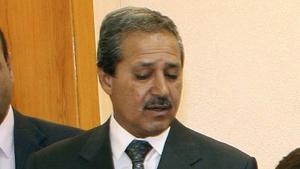SyriaAnother top Syrian defection signals growing Sunni disaffection
Nawaf Fares, Syria’s ambassador to Iraq, has defected and joined the anti-Assad forces; Fares is also the chief of the Sunni tribe Uqaydat, which controls long stretches of the border area between Syria and Iraq; since 1970, one of the central motifs of the Assad regime – father and son – has been an emphasis on cohesion among the Syrian people in an effort to unify the diverse Syrian society; the regime has enjoyed the support of Alawites, Druze, Christians, and moderate Sunnis; the defection of a second leading Sunni supporter of the regime in as many weeks — Brig. Gen. Manaf Tlas defected last week – is one more indication that Syrian society is fracturing along ethnic and religious lines

Syrian ambassador to Iraq defects from the Assad regime // Source: sverigesradio.se
The Assad regime suffered another body blow yesterday with the defection of Nawaf Fares, Syria’s ambassador to Iraq, who announced that he was joining the anti-Assad coalition.
“I call on all [Baath] party members to do the same because the regime has transformed it into a tool to oppress the people and their aspirations to freedom and dignity,” Fares said in a message broadcast on the
Al Jazeera network. “I announce, from this moment on, that I am siding with the people’s revolution in Syria, my natural place in these difficult circumstances which Syria is going through.”
Fares was Syria’s ambassador in Iraq since 2008.
The BBC notes that as important as Fares’s position in the upper echelons of the Syrian foreign service is his position as chief of the Sunni tribe Uqaydat. The Uqaydat control long stretches of the border area between Syria and Iraq. One of the main cities in the area, Deir al-Zour, has been repeatedly, and heavily, bombarded by the Syrian army.
Fares’s defection is the second defection in as many weeks by a leading Sunni figure long associated with the Assad family. Las week, Brig. Gen. Manaf Tlas, commander of a unit of the elite Republican Guard and a military academy classmate of Bashar Assad – and whose father, Mustafa, served as Syria’s defense minister from 1972 to 2004 — left Syria for Paris with his family.
The Baath Party has always presented itself as no-denominational, and the Alawite Assad family, which took power in Syria in 1970, emphasized government’s secularism. Assad recruited and promoted members of religious minorities, such as the Alawites, Druze, and Christians to position of leadership, and in turn his regime received the support of many members of these groups. Assad also promoted moderate Sunnis, and the Tlas and Fares are but two examples.
The Hafez Assad government, in an effort to make an Alawaite government more palatable to the majority Sunni population, launched propaganda and education campaigns in the early 1970s to instill a sense of national pride among the Syrian people and unify the diverse and fractured Syrian society.
The regime did not tolerate religious activism, as evidenced by the harsh campaign it conducted against the Syrian Muslim brotherhood in the early 1980s. The repression culminating in the 1982 Hama massacre, in which about 20,000 Sunnis were killed when the Syrian army flattened the city.
Most of the violence inflicted by the Syrian army has been directed at the Sunni villages and neighborhoods, thus opening, and deepening, the very ethnic and religious divisions the Assad regime, since 1970, has been trying to bridge. The defection of two leading Sunni supporters of the regime is one more indication the that the nationalist, all-Syrian coalition the Assads have been trying to build for the last four decades is now coming apart.
